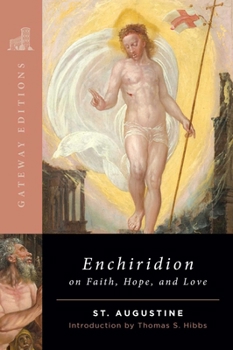The Enchiridion on Faith, Hope, and Love
Select Format
Select Condition 
Book Overview
"...the ideas of this man furnished the themes for the piety and theology of more than a thousand years. No one possessed the "whole" Augustine, but all lived upon the fragments of his spirit from which each appropriated and understood what was "adapted" to his own wants." --Reinhold Seeberg The Enchiridion on Faith, Hope, and Love was written by St. Augustine to supply a well-educated Roman layman with a brief but comprehensive exposition of the essential teachings of Christianity. It contains many of Augustine's most profound thoughts on sin, grace, and predestination, and might surprise modern readers with its emphasis on a reasoned, intellectual approach to faith. The Enchiridion (a term that comes from the Greek for "handbook") is an indispensable guide to understanding St. Augustine and is, in itself, a catechism for readers seeking an appreciation of early Christianity. Now with a new introduction by Boston College professor of philosophy, Thomas Hibbs.
Format:Paperback
Language:English
ISBN:0895267039
ISBN13:9780895267030
Release Date:September 1996
Publisher:Gateway Editions
Length:173 Pages
Weight:0.55 lbs.
Dimensions:0.4" x 5.5" x 8.3"
Customer Reviews
2 ratings
Summary of much doctrine
Published by Thriftbooks.com User , 20 years ago
This is an excellent book, both for the text itself by Augustine and the introduction to it. Augustine wrote the Enchiridion as a response to a friend who wanted a "handbook" of Christian teaching. Though not as engaging as his Confessions, it is well worth reading. Augustine covers topics such as baptism, original sin, abortion, faith and works, and election and focuses much on the grace of God. Leaving out a few sections that don't seem to agree with a Reformed understanding of scripture (e.g., some parts on baptism), I would actually recommend this as an introduction to many Christian doctrines. (Then again, I'm not a professional theologian.) I honestly thought some chapters sounded like they came from more recent Reformed Presbyterians since Augustine argues for the same doctrines. (I count myself in that camp) As for this particular edition, the introduction by Thomas Hibbs was very useful to me as I knew nothing of what led to the writing of the Enchiridion or of its structure. Though the chapters are generally short, Augustine's thoughts flow naturally from one subject to the other. Thus, try to keep the train of thought or you will get lost! I recommend this particular edition for the introduction, readable translation, and the text itself: Augustine's "off the cuff" summary of what he thought were doctrines that should be in a "handbook" of Christianity.
"Brief Handbook of Augustinian Thought"
Published by Thriftbooks.com User , 23 years ago
The theological insight propounded by Augustine, in his "Enchiridion"(Greeek for handbook),remains unparrelled when contrasted with the concise nature of this work. Augustine necessitated nearly all the creedal professions and beliefs of the Nicene Fathers with an uncanny brievity. As intended, then, for an educated Roman layman, the "Enchiridion," now, raises interest in those who come in contact with it today. The three-fold division of faith, hope and love, at times, seems a bit obscure and difficult to detect. In other words, I had some trouble identifying Augustine's thesis as a whole(as the translators did also). However, this was mearly a work that was quickly thrown together(Augustine makes this apparent at the opening),and is to be highly respected for its in-depth learning. I doubt that Augustine intened his "handbook" to become some sort of "magnum opus"...it's strictly a handbook. Augustine also deals with grace, original sin, repentance, and predestination with a scholars lore. This work conveys an image of Augustine's thought in relation to the Orthodox beliefs of Christianity then and now, and continues to stand as not his greatest, but yet, one of his most unique works.






